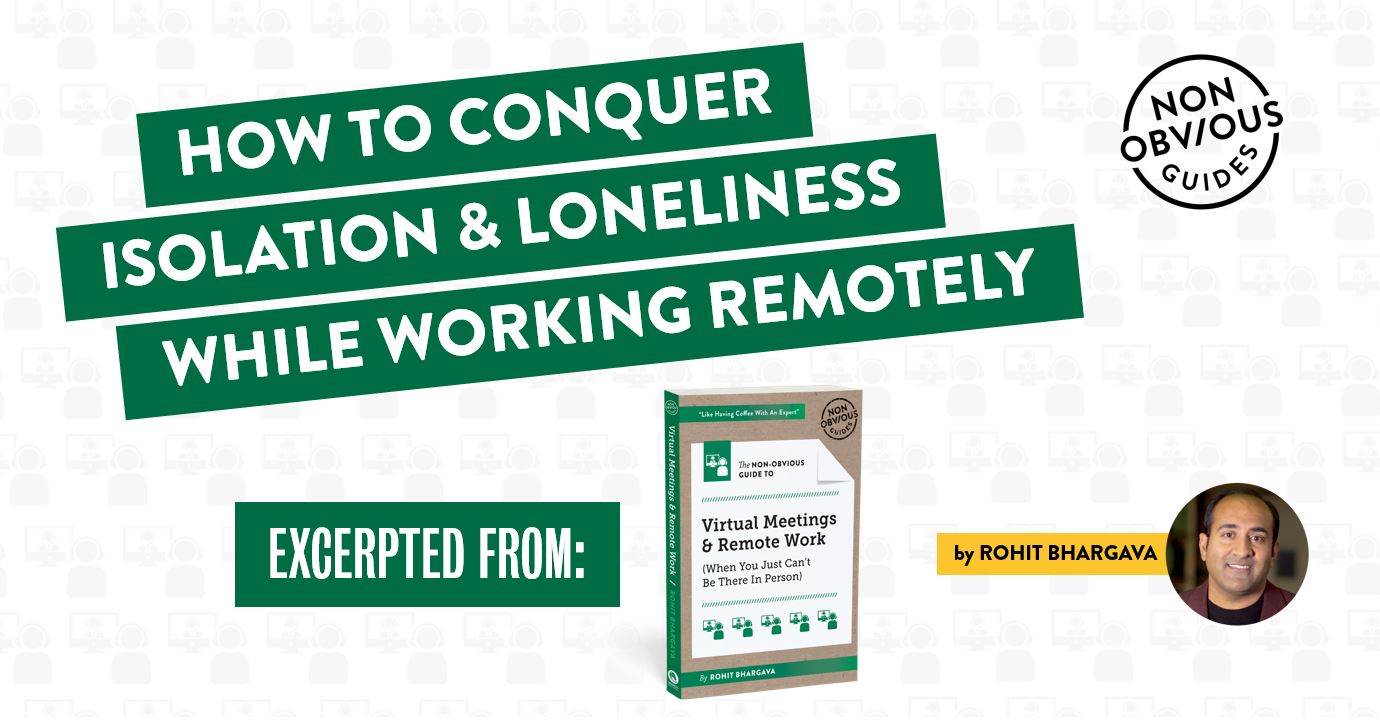Last week I attended a virtual book launch event hosted by a DC-based networking group called Cadre where former Surgeon General Vivek Murthy spoke about his new book Togetherness. The book explores how loneliness is an underappreciated public health epidemic – a particularly relevant topic today at a time when many people have been forced into working isolation and offices have been closed.
It is natural to crave human connection, and people new to working remotely often cite the isolation and loneliness as their biggest struggle. As I explored the topic over the last several months as part of the research for my own newly released book, the first thing I realized is that isolation and loneliness are usually two different problems.
Isolation is a feeling of disconnection that can come from processes or a workplace culture that removes them from colleagues or information.
Loneliness, on the other hand, is an emotional state and can happen with those working remotely as well as those who go to an office and are surrounded by people.
Working without colleagues around can be lonely, and the sense of isolation can lead to depression or a feeling of disconnection from everyone else. Even if you have virtual meetings regularly or visit the office on occasion to meet with people, this is one of the most common and natural emotions you may feel.
The good news is, from my research and many interviews with smart people who have been working remotely successfully for years, I discovered there are some smart ways that you can address both issues, be more productive, keep your sanity, and connect with others while working remotely. Here are the biggest lessons I learned:
1. Audit The Isolation Moments
Back when I was working in an office in D.C., I used to get interoffice emails about colleagues’ birthday parties. Then I started working remotely in the same job and one day they stopped. Modern workplaces are full of moments like this when remote workers are unintentionally cut off from the team, but we can prevent that if we can understand when they happen. Back then I never mentioned to anyone how it made me feel to be taken off the list, and no one ever asked. Looking back now, I use the example as a reminder for myself and leaders whom I advise that sometimes you have to ask about these small things in order to identify them … and then you can do something to fix them.
2. Connect With Individuals, Not Groups
Contrary to what some people think, spending too much time on social media seeing how connected everyone else seems is a recipe for making yourself lonelier. Instead, reach out to reconnect with people individually. The individual part of this, is key. One on one time is valuable in real life, but it can be valuable virtually too. You might be surprised how many friends who appear to have amazingly complete lives on social media are just as hungry for a real connection as you are.
3. Focus On Giving & Sharing
Could you find a volunteer group where your time might be valued? What about sharing your expertise online with people who could benefit from it? There are many places, causes, and people who could use your help right now. When you focus on what you can give instead of what you miss, you can change your perspective. Not only can this be of great value for your community, but also you can feel positive yourself and make some connections in the process.
4. Accept More Invitations
Anytime I started to feel disconnected from colleagues, I realized it was at least partially self-inflicted. I was too busy to go to the events I had been invited to. I would retreat into my home-based cocoon. Don’t make the same mistake. When you are invited to participate, make it happen. And seek out those events or interesting gatherings happening (virtually now, and real life later) where you can be part of something bigger.
5. Find A Mentor (Or Become One)
Many modern companies are using programs such as reverse mentors to ensure everyone feels connected – even those working remotely. If your company has a program like that, join it. If not, try to find a similar group in your area that runs this type of program. Similar to the benefit of having one on one time with someone, this type of learning-based relationship can really help you feel socially connected, whether you’re the one doing the mentoring or you’re the one being mentored.
6. Spend Money (And Time) On An Experience
Any number of self-help books will tell you that the path to happiness lies in focusing on experiences instead of accumulating more stuff. Think about how you might spend money on an experience that can allow you to feel more connected with other people and challenge yourself to do something new and unusual, whether it is jumping out of a plane or trying a new cuisine via takeout.
These insights are excerpted from my latest book, The Non-Obvious Guide to Virtual Meetings & Remote Work that is now available. You can pick up a full copy of the book by visiting your favorite bookstore online or buying directly from Bookshop.org.







WE RECENTLY REMOVED COMMENTING - LEARN WHY HERE >